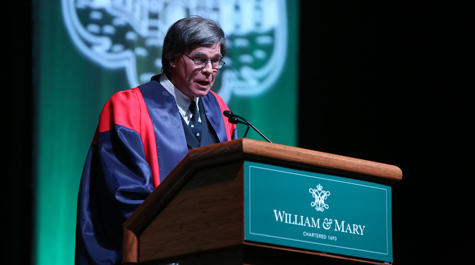The story behind the inaugural poem
The way Henry Hart viewed it, the poem he wrote and recited at Katherine A. Rowe’s inauguration as president of William & Mary on Feb. 8 in Kaplan Arena was part of a gift exchange.
“I like to think of a poem as a gift,” said Hart, Mildred and J.B. Hickman Professor of English and Humanities at the university. “So, I was thinking maybe I could talk about Katherine Rowe’s gifts. She’s giving her gifts to the William & Mary community; I gave her a gift of thanks with my poem.”
Hart, who became Poet Laureate of Virginia last July, was invited by John Littel, Rector of the Board of Visitors, to create a surprise for Rowe that celebrated the fact that she is the university’s first woman president.
Several factors played into Hart’s ultimate villanelle, a poetic form with nineteen lines and a strict pattern of repetition and a rhyme scheme.
He knew that Robert Frost had written and delivered a poem — The Gift Outright — for an event at Phi Beta Kappa Hall in 1941. He also knew that Frost, unable to read his intended poem at the 1961 inauguration of President John F. Kennedy for a variety of reasons, among them his failing sight, salvaged the moment by reciting his Phi Beta Kappa poem from memory on that frigid January day.
“I thought about the idea of being the first,” Hart said. “William & Mary has been the first in many areas; some people say even the conception of William & Mary was the first. Back in 1618 or 1619, there were some people around Henrico County making plans for the College of William & Mary. We had the first intercollegiate fraternity society in Phi Beta Kappa.
“I was thinking maybe write a poem about those firsts, and work in Katherine Rowe as first female president. She’s also one of the first English professors to become president."
Hart has been working on a book about Seamus Heaney, an Irish poet, playwright and translator who received the 1995 Nobel Prize in Literature. Heaney had what Hart called a “preoccupation” with gifts and gift exchanges.
“So," he said, "I thought maybe I could work that subject into the poem."
Then there was Rowe herself. Last summer, Hart read Rowe’s book, “Dead Hands,” and found the last bit of inspiration he needed.
“The book really begins with a discussion of gifts and gift exchange in ‘Beowulf,’” Hart said.
Ultimately, Hart’s work touched on the fact that the university is celebrating the 100th anniversary of coeducation and that “after all of these centuries of men being our presidents, finally we have a woman as our president.”
“Now it is time for William to move aside for Mary,” Hart wrote. “It’s time for our new president to write her story.”















